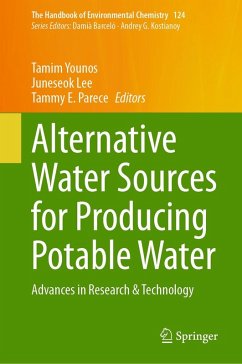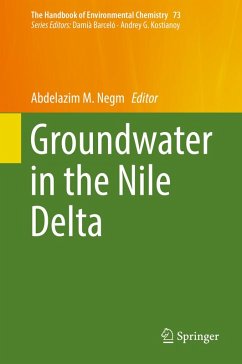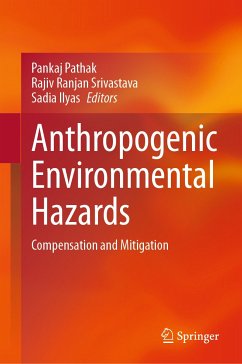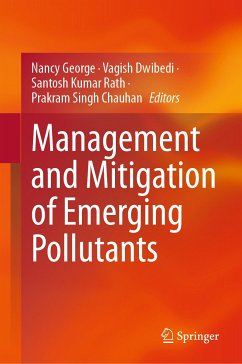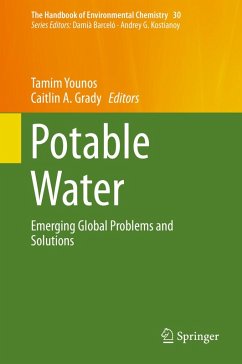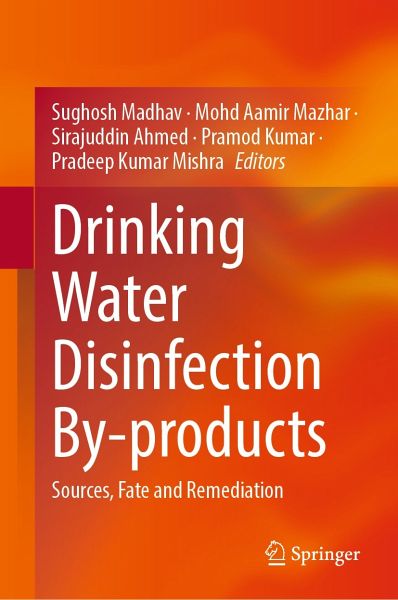
Drinking Water Disinfection By-products (eBook, PDF)
Sources, Fate and Remediation
Redaktion: Madhav, Sughosh; Mishra, Pradeep Kumar; Kumar, Pramod; Ahmed, Sirajuddin; Mazhar, Mohd Aamir
Versandkostenfrei!
Sofort per Download lieferbar
128,95 €
inkl. MwSt.
Weitere Ausgaben:

PAYBACK Punkte
64 °P sammeln!
This book is devoted to water treatment and it outlines the historical context and regulatory framework surrounding drinking water chlorination, addressing disinfection by-products (DBPs) formation, associated challenges and implications on water quality and human health. In this book, readers will find an overview of various disinfection processes and the latest strategies in DBPs detection and remediation. Divided into 14 chapters, the book begins by offering a background analysis of water disinfection and comparing different disinfection processes and management strategies to mitigate the f...
This book is devoted to water treatment and it outlines the historical context and regulatory framework surrounding drinking water chlorination, addressing disinfection by-products (DBPs) formation, associated challenges and implications on water quality and human health.
In this book, readers will find an overview of various disinfection processes and the latest strategies in DBPs detection and remediation. Divided into 14 chapters, the book begins by offering a background analysis of water disinfection and comparing different disinfection processes and management strategies to mitigate the formation of DBPs. Particular attention is given to both conventional and non-conventional methods used to treat potable water, comparing their effectiveness and potential risks. In subsequent chapters, expert contributors outline the route of exposure and mechanism of action of DBPs, and the toxicological impact of DBPs on human health, providing essential insights for effective risk management strategies. This book also showcases the latest advancements in chlorine applications for water quality control and explores innovative physicochemical and nanotechnology-based approaches to remove DBPs and minimize their formation. Readers will also find in this book a case study of the GIS-based trends analysis of THMs compounds in Indian drinking water supplies.
Given its breadth, this book is a valuable resource for researchers, academics, professionals, and policymakers working in environmental sciences, public health and water management, and interested in safer and sustainable drinking water practices.
In this book, readers will find an overview of various disinfection processes and the latest strategies in DBPs detection and remediation. Divided into 14 chapters, the book begins by offering a background analysis of water disinfection and comparing different disinfection processes and management strategies to mitigate the formation of DBPs. Particular attention is given to both conventional and non-conventional methods used to treat potable water, comparing their effectiveness and potential risks. In subsequent chapters, expert contributors outline the route of exposure and mechanism of action of DBPs, and the toxicological impact of DBPs on human health, providing essential insights for effective risk management strategies. This book also showcases the latest advancements in chlorine applications for water quality control and explores innovative physicochemical and nanotechnology-based approaches to remove DBPs and minimize their formation. Readers will also find in this book a case study of the GIS-based trends analysis of THMs compounds in Indian drinking water supplies.
Given its breadth, this book is a valuable resource for researchers, academics, professionals, and policymakers working in environmental sciences, public health and water management, and interested in safer and sustainable drinking water practices.
Dieser Download kann aus rechtlichen Gründen nur mit Rechnungsadresse in A, B, BG, CY, CZ, D, DK, EW, E, FIN, F, GR, HR, H, IRL, I, LT, L, LR, M, NL, PL, P, R, S, SLO, SK ausgeliefert werden.



